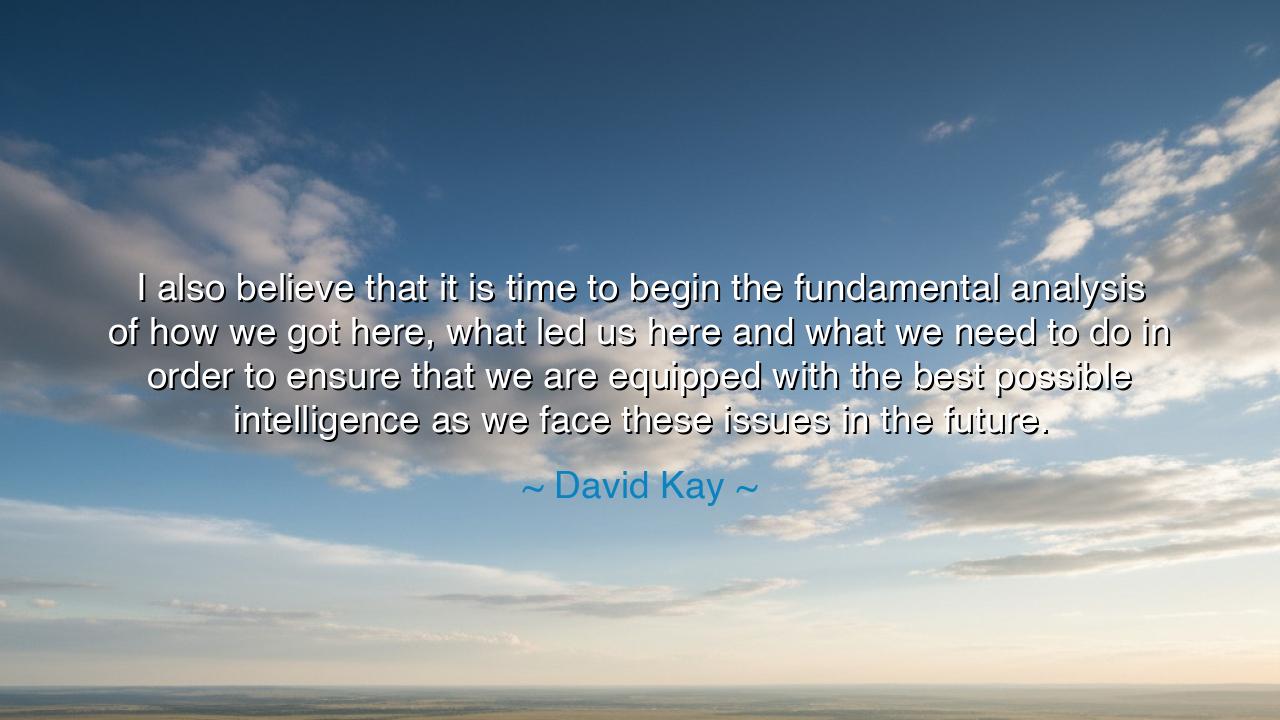
I also believe that it is time to begin the fundamental analysis
I also believe that it is time to begin the fundamental analysis of how we got here, what led us here and what we need to do in order to ensure that we are equipped with the best possible intelligence as we face these issues in the future.






In the course of human history, there are moments that demand reflection—times when we must pause and ask ourselves not just what has happened, but why it happened and how we can move forward with greater wisdom. David Kay’s words, “I also believe that it is time to begin the fundamental analysis of how we got here, what led us here and what we need to do in order to ensure that we are equipped with the best possible intelligence as we face these issues in the future,” call us to introspection and action. Kay’s call for a fundamental analysis speaks to a universal truth: understanding the past is essential to preparing for the future. Only through the deep examination of what led us to this point can we hope to move forward with clarity and purpose.
In the ancient world, the great thinkers constantly turned their attention to understanding the past as a means to shape the future. Herodotus, often called the father of history, traveled the ancient world, gathering stories and insights to understand the causes of events. He understood that history was not just a collection of facts, but a guide to human behavior and the decisions that shaped the course of civilization. Socrates, too, believed that wisdom came not from simply knowing, but from questioning and understanding. His approach to philosophy—asking probing questions and reflecting on life’s experiences—was rooted in the idea that true knowledge required deep analysis of what had come before. In much the same way, Kay’s words remind us that we must analyze the past and its failures in order to build a more informed and prepared future.
The fall of Rome provides another striking example of the importance of reflecting on the past to guide future action. The empire, once a mighty force, fell due to a combination of internal corruption, external threats, and mismanagement. The Roman Senate, once a bastion of reason, became riddled with incompetence and betrayal. Had the Romans taken the time to analyze their own decline, to reflect on the forces that weakened them, perhaps they could have reformed and staved off collapse. But in their failure to truly look at their own history, they missed the opportunity to change their trajectory. Similarly, Kay’s insight challenges us to do more than react to the present moment—we must understand the forces that have led us to where we are and prepare ourselves accordingly.
In the more recent history of the Cold War, the intelligence community also faced critical moments of introspection. The Cuban Missile Crisis was a pivotal moment when intelligence failures almost brought the world to the brink of nuclear war. In its aftermath, the United States realized the necessity of a stronger, more integrated intelligence apparatus, one capable of providing the insights and forecasts needed to avoid future crises. The Cuban Missile Crisis served as a turning point, forcing the government to look back at its intelligence practices and fundamentally change how it approached national security. Kay's statement reflects this same need for self-examination and adaptation—the past holds lessons that are vital for navigating the complexities of the future.
The need for introspection is not limited to political or military events; it is also relevant in our personal lives. We all face challenges, setbacks, and moments of failure that test our resolve. Whether in relationships, career, or health, the failure to examine our decisions and actions often leads to repeating the same mistakes. It is through the analysis of our past choices that we can learn and grow, much like Kay’s call for analysis in the context of national intelligence. Just as we must reflect on what has failed us in the past, we must also recognize what has succeeded—and understand why those moments were successful. Only through this reflection can we move forward with clarity and purpose.
The lesson from David Kay’s words is profound: knowledge of the past is not merely a tool for reflection, but a weapon for the future. To succeed, whether in personal growth or in the larger scope of national security, we must be willing to ask the tough questions: What went wrong? What can we learn from this? How can we build a better tomorrow? These questions are not signs of weakness but of wisdom. Just as Herodotus traveled to learn from the histories of others, so must we be students of our own history, constantly learning and evolving from our own experiences.
In your own life, take a moment to reflect on the path you have traveled. What choices have led you to where you are now? What can you learn from them? Use Kay’s insight as a guide: be willing to examine your own experiences, whether personal or professional, with a critical eye. Look for patterns, lessons, and opportunities to grow. Whether in your relationships, your work, or your personal journey, the process of introspection will equip you to face future challenges with greater wisdom and a clearer vision. Understanding the past empowers us to shape the future, just as Kay urges us to do in the world of intelligence and beyond.






AAdministratorAdministrator
Welcome, honored guests. Please leave a comment, we will respond soon